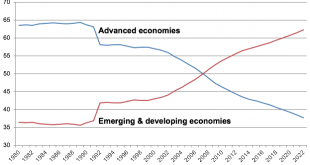I was going to write about Jamaica today but this topic emerged that I thought I should deal with before I write about the home of reggae. In fact, some of the material is input into a reasoned discussion about Jamaica so it logically precedes it. With the increasing profile of Modern Monetary Theory (MMT), social media activists are wont to talk about MMT in various ways that, in many cases, do not bear resemblance to our work. But that doesn’t stop them claiming things about what we have...
Read More »Justin Podur — Why It’s So Hard for Most Countries to be Economically Independent from the West
The structures of the global economy present challenges to any country or political party that wants to try to break out of U.S. hegemony. Even for countries as big and with as much potential as Brazil or Egypt, countries that have experienced waves of relative independence, the inertia of these economic structures helps send them back into old patterns of extraction and debt. In this moment of right-wing resurgence it is hard to imagine political movements arising with plans to push off...
Read More »Bill Mitchell — Inclusive growth means poverty reduction and declining income inequality
I am doing some work on the way technology can be chosen to maximise employment in the pursuit of advancing general well-being. This is in the context of some work I am doing on advancing what is known as ‘relative pro-poor growth’ strategies in Africa via employment creation programs and draws on my earlier work in South Africa on the Expanded Public Works Program. In the current work, I have been assessing ways in which the Labour Intensive Public Works program in Ghana has been deployed...
Read More »Zhang Jun — China Deserves its Economic Success
In 1995, the late economist Gustav Ranis wrote that, “If there is one key to developmental success, it is avoiding the encrustation of ideas,” which is achieved through policymakers' “ever-increasing reliance on the responsiveness of large numbers of dispersed decision-makers.” That description suits China perfectly. Agility. Project SyndicateChina Deserves its Economic Success Zhang Jun | Dean of the School of Economics at Fudan University and Director of the China Center for Economic...
Read More »Andrew Sheng and Xiao Geng — China’s Four Traps
An issue with this analysis as I see it is that it is based on a Western approach to economics and finance that is not applicable to China as a socialists country with its own development path. The first point they make is this: The first is the middle-income trap. With a per capitaannual income of around $9,000, China remains significantly below the threshold for high-income status, set at around $12,000-$13,000 by the World Bank. Only a few countries in history have managed this leap...
Read More »Timothy Taylor — The Remarkable Fall in Global Poverty
There's a problem here in this analysis. It ignores the informal economy, much of which is not monetized. The push of capitalism is to monetize it. The problem arises in comparing quality of life before and after monetization. The people appear to be wealthier and to receive more income, but their quality of life may be much, much lower, since they no longer have access to the resources and processes they had previous to monetization and capitalization (privatization). It's like saying...
Read More »Suchi Kedia and Ian Cronin — The Indian miracle state pointing the way to global sustainabilit
Andhra Pradesh is playing catch-up.World Economic Forum The Indian miracle state pointing the way to global sustainability Suchi Kedia and Ian Cronin
Read More »David Fields — Imperialism in the 21st Century
With respect to to this post, readers might be interested in a long set of follow-up debates below. h/t Patrick Bond, whose contribution was just published here at Human Geography. David Harvey Denies Imperialism In a major critique of David Harvey’s work, the radical political economist John Smith takes on Harvey’s claim that the “East” is now exploiting the “West,” a statement, he argues, that is backed up by nothing more than his authority. Harvey could not be more wrong, or about a...
Read More »World Economic Forum — Emerging economies are now richer than the West
Emerging and Developing Economies for the First Time Account for a Larger Share of World GDP or Global Output Than Developed Economies; A Point Surpassed After the 2008 Financial Crisis That Has Continued Apace (See Figure 1).... How has this been achieved? Possessing good institutions is what economists have come to focus on and the spread of such institutions seems to have been key, as the father of New Institutional Economics predicted. The seminal work in this area was by Douglass...
Read More »William Lacy Swing — How migrants who send money home have become a global economic force
More people are on the move around the world than ever before. An estimated 258 million people are currently living outside their country of origin. Every migrant chooses to leave home for different reasons, but they all bring their life experiences, knowledge, culture and ambitions with them. As they settle into life in their host countries, they acquire new skills and know-how. And they contribute to their families and communities in their country of origin by sending money home.Financial...
Read More » Heterodox
Heterodox

